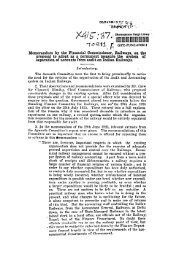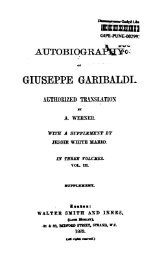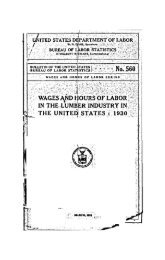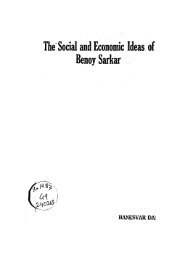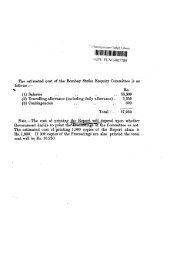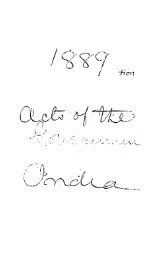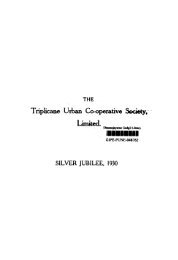Create successful ePaper yourself
Turn your PDF publications into a flip-book with our unique Google optimized e-Paper software.
t74 INDIAN OPINION July loth. 1925<br />
African Government has not been slow in taking<br />
. advantage o~ it and they are working out in a most<br />
intensive and, vigorous manner. Up to now about<br />
35 000 Indians have been turned out of South Africa<br />
and-they are all the victims of those false statements<br />
that is India is prosperous, that labour is scarce, that<br />
prices are low and that all of them could be absorbed<br />
in the country and could easily seUle th~mselves.<br />
But as we all know the majority of them have been<br />
stranded here and their condition is simply deplorable.<br />
There is not one amongst them ~ho, if<br />
allowed, would not go back to South Afnca. At<br />
present, there is great unemplo~ment. thro~ghout<br />
the country, rice is se-lling at scarcIty prIces, dls~re~s<br />
is acute. Still the Government of South Africa s<br />
false allnrements have been left to pass unchallenged.<br />
The Government of India's share and Sir B. N.<br />
Sarmacs toq-in this sin of negligence an!l of eV~Il,-',<br />
tnal ilu1f-eri!llg~is very~great. 'Have th~y' no u~(?asy'<br />
conscience when even a few weeks back, 403 repatriates<br />
have been dumped on India and every quarter<br />
the steamer would bring about 500 of the-se unfortunate<br />
people? Unless they are a party to the<br />
deception or nnless they wink at the idea that Indians<br />
would all do well to come back to India, their<br />
silence is inexplicable.<br />
• SIR B. N. SARMA'S F AIr.URE<br />
The first step i~ for the Government to tell them<br />
that.conditions are not favourable in India for their<br />
settlement and that they should come to India at<br />
their own risk. It will be the sheerest humanity to<br />
do this and the Government of India should not be<br />
lax as they qad been- all these years. Of course, the<br />
greatest disappointment is Sir B. N. Sarma who,<br />
though he held the portfolio fOl JI. long pe-riod, had<br />
utterly failed to grasp the mi~chief aad suffering<br />
caused by the repatriation sche-me. It is to be hoped<br />
that the new member in charge of the portfolio will<br />
do something to see that the poor Indians are not<br />
turned out of South Africa on false hopes. Let them<br />
cume at their own risk by all means. But the Government<br />
of India's responsibility for these 35,000<br />
Indian/! ~nd for those .cOining: hereafter is very great.<br />
Nothing seems to have bepn done to provide suitable<br />
employment for them or their return "home" comfortable<br />
and happy.<br />
It is therefore,' essential that some non-official<br />
Indian' who knows two or three vernaculars is sent to<br />
South Africa either by the Government or by private<br />
philanthropic men and associations to tell the people<br />
there that they can come here at their own risk and<br />
that cpnditions of trade, industry and agriculture are<br />
not very bright and promising, especially in Southern<br />
India to Which, unfortunately, most of these repatriates<br />
belong. .. . .<br />
Even though like sItuations are developmg lD<br />
East Africa and there is a possibility of somebody<br />
bringing or making indiscreet admissions in East<br />
African affaIrs, the urgent 'question i$ now that of<br />
South, Africa. While the Class Areas Bill, Ordinances<br />
and Franchises are aimed at impoverishing<br />
the Indian well-to-do element, the repatriation<br />
scheme is aimed at driving out labourers and humble<br />
folk. Unless some strong steps are taken, we shall<br />
not be surprised if in course of time even these weIlto-do<br />
merchants and traders are slowly pulled down<br />
to the scale of repatriation.<br />
We have been asked' by the Secretary of the<br />
Young Men's Vedic Society to announce that the<br />
weekly meeting of the Society hitherto he-Id on<br />
Sundays will, as from the 15th instant, be held on<br />
Wednesdays. The first of these meetings will be<br />
held on Wednesday next at 7 p.m. at the Hindu<br />
Tamil1nstitute Oross Street, when a general discussion<br />
on how best to b~tter the condition of Indians<br />
in SQuth Africa will. take place.<br />
EUROPEANS IN INDIA<br />
Mr. Wentworth Stanly's speech at the European<br />
Association's meeting at Karachi shows elements of<br />
liberality not usually. conspicuoull at- -such gatlier-'<br />
ings.<br />
He stressed, of course, the words "gradual<br />
realisation of Self-Government," but recognised<br />
that t4e Indian aspiration was perfectly legitimate',<br />
that Britain was pledged to satisfy it. He (lil .. ted<br />
on the importance of ,British capital to India, but<br />
urged that the non-official European should show..<br />
"that he is as keen as the nor.-official Indian for tb '<br />
betterment of the masses amonlt whom he lives."<br />
The implication, we hope, is that the keenness is a<br />
quahty which has yet to be cultivated, and is not<br />
to be claimed as a mere adjnnct of the British<br />
"trusteeship." Briti&h capital is invested all ovei'<br />
the world, and because of that factj Britain does ~6t<br />
claim a ,share in the :direction of: aU ,tlUier coun'trl'elf'<br />
affairs. The British commnnity in India is certainly 1 ,<br />
entitled to fair play, but being a small minority, it<br />
mllst be content to let India be governed by Indian~.<br />
The weather remains unchanged. For the moment<br />
one forgets that he is in England and well mly<br />
he believe he is in sunny South Africa. The high.<br />
est reaiing this summer is 85 in the shade.<br />
The death of the Maharajah Scindia of Gwalior is<br />
reported to have tabn place on the 5th inst., in<br />
Paris. The Maharanee and ber two children aged<br />
twelve and eight were with the Maharajah at the<br />
end. His heir is George Jivavi Rao, about 9 years<br />
old, for whom the King stood sponsor. The cremation<br />
ceremony was held at the cemetery of pere.<br />
La Chase. Among those, a~t~,n,di~g ,wrr~."W~1AP.,<br />
Khan the Maharajan')'Gaekviar' of Bargda, ana the<br />
Maha~jah of Kolkapui. ' " ,<br />
The Maharajah of Gwalior was one of the' fi ve<br />
Indian Princes entitled to a salute of 21 guns. In.<br />
recognition of his enlightened rule over his cpu,ntry,<br />
among other honours, the hon01:ary, degree!,! of L.~ ..nc<br />
of Cambridge and D.O.L. of Oxford were conferred<br />
on him. He was born on the 20th October 1876<br />
, and at the age of 10 I!ucceeded his father as a rnlel'<br />
of a country with an area of some 26,000 sqnare<br />
miles, a population of over 3,000,000 people, producing<br />
a revenne to the State of about £1,500,000.<br />
He was brought up as a soldier and in 1901 at the<br />
age of 25 !laW service in Ohina as orderly offi~I' to<br />
General Gaselee. On this occasion he fitted out at<br />
his own expense the hospital Ship Gwalior which<br />
was found to be very serviceable. He was one of<br />
the most loyal subjects of the King. To mark the<br />
Coronation of the King, he gave £8,000 for distri~<br />
bution among the charitable institution's in England j<br />
which the King described as noble. He sent ~m ~<br />
outbreak of the Great War, troops to the a8SIstan~e,<br />
of the British. He advanced to the Indian Govet;n.<br />
ment a' loan of 5,000,000 rupees, free of interest; ~!t/<br />
would not accept the immediate p~~ent ,!>r. ,~AAt ,<br />
Uovernmtmt of 3,800,000 rupE!es and' inves.te



